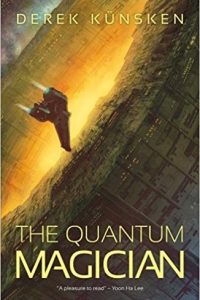Eileen Gunn Guest Post–“Quick! Act Without Thinking!”
Locus Online has very kindly asked me inaugurate their new series of guest blog-posts by talking about my just-released short-story collection, Questionable Practices.
The stories, of course, concern well-intentioned but highly questionable decisions on the part of people who act faster than they think. If they’d thought twice, or maybe three times, they would never have followed the sasquatch into a cave, or gone bowling with frozen turkeys, or set the time machine for the Middle Ages. You wouldn’t do any of these things, would you? If you would, these stories explain why you might want to reconsider.
When I chose the title for my collection, it occurred to me that it served as a description of my writing process as well. My practices are few, and too irregular to be called a system: they are highly questionable. And I have to admit, they slow me down.
I used to think I had writer’s block, but I think it’s more accurate to say that sometimes it just takes me a while to figure out what I’m doing. I’ve learned to deal with this by ignoring it: I just keep writing through the part where I don’t know what’s going on, instead of stopping to think about it.
Deadlines are useful here, as are timed writing bursts: they focus my attention on getting words on paper, not so much on what I’m saying. Once I have words on paper, I have something to edit, and I feel more in control of the story.
This works well for me, because I don’t actually like to know what is going to happen next. Outlines always seem baldly linear–it’s the narrator’s voice that matters to me, not the events of the story. I especially enjoy writing when the narrator is not quite telling the truth, or is trying to figure out a question that I don’t know the answer to. I like narrators who surprise me. If I can figure out in advance what is going to happen in the story while I’m making it up, I almost always want something different to happen, and I don’t care what. It’s a kind of claustrophobia: I desperately want out of the plot.
This makes it hard to think I’m writing a coherent story, so I have learned, mostly in the past decade, not to worry too much about it. Coherence and intelligibility are attributes that are imposed on my stories after the fact: I simply have to trust that the story will eventually make sense.
To some extent, stories depend on delivering on expectations: there has to be some kind of internal logic to a story for it to satisfy the reader. Different writers have their own kinds of internal logic, just as different readers have their own ideas of what makes sense.
So, after a story is done, I sit down and talk to it, try to figure out what it thinks it’s about. I try to help it be more what it wants to be. I try to correct errors in its thinking–places where, seduced by the sound of its own voice, it wanders away from what it really believes. It’s a kind of parent-child relationship, and I am a permissive parent who tries to foster independent thought in her offspring.
This is a terrible way to produce fiction. I cannot advise this to anybody.
About the Author:
Eileen Gunn is the author of two short story collections: Questionable Practices (Small Beer Press, 2014) and Stable Strategies and Others (Tachyon Publications, 2004). She is at present working on a novel for which she knows the entire plot, and is finding it is much easier than writing a short story.
Twitter: Eileen_Gunn
Website for Questionable Practices: http://www.questionablepractices.net





It may be a terrible way to make a living producing fiction, but it produces wonderful, living fiction.
Thank you, Scott!
Whatever you do, it seems to work. Your work is very good, at least the stories I’ve read have been.
This method is madness — and I know it very well, since it is, approximately, the same thing I do.